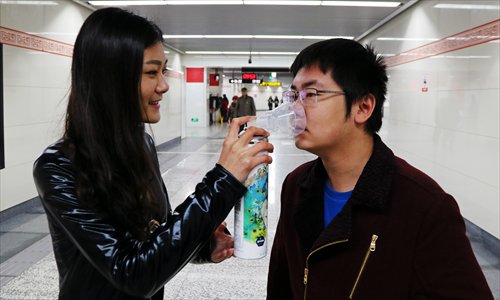Smog-choked Chinese order Canadian bottled air, despite doubts over benefits

A passerby tries a fresh air can at a subway station in Zhengzhou, Central China's Henan Province on November 10. It was part of a promotional stunt by a real estate developer. Photo: CFP
"Let's have some fresh air from Canada!" Recently Canadian fresh air has been a buzzword on Chinese social media, as a Canadian startup is importing bottled fresh air from a ski resort, selling 500 bottles in four days with thousands more orders pouring in.
The company, Vitality Air, which has been compressing fresh air from Banff National Park in Alberta into cans and shipping them across the globe since November 2014, first sold the air as something of a novelty product in North America. But after it entered the Chinese market in October, it quickly saw rising demand from local customers, especially those who spend much of their lives cloaked in heavy smog.
Although the company claimed that its business is part of a growing industry and its mission is to help people breathe easily, some Chinese experts claimed that selling bottled air is a publicity stunt and has no practical purpose.
One breath at a time
"After the company began to sell bottled air in China, 500 bottles were sold in four days. Now we have received 4,000 pre-orders," Qi Yimin, marketing director of Vitality Air's China operations, told the Global Times.
The bottled air is selling for $14 to $20, depending on the size of the canister. One 7.7-liter bottle contains about 150 lungfuls of fresh air and costs about 120 yuan ($18) online.
According to Qi, the bottled air was previously marketed to clients in North America, and now its business has been expanded to China and countries such as Israel, Turkey and the United Arab Emirates.
Qi said that the bottled air could supplement people's need for fresh air. "Although masks and air purifiers can filter air, they lead to higher concentrations of carbon dioxide. Bottled air could help adjust one's body function to cope with a poor environment," said Qi, adding that the air was mainly sold to high-end clubs and international schools in Beijing, Shanghai and various northern Chinese cities.
The Global Times found that there were a total of 207 orders as of Tuesday on the company's Taobao store.
"It is my first time to breathe air from a foreign country. It is a little bit sweet and fresh and smells better than the smog in Tianjin. Although the price is a bit high, it is worthwhile," one customer wrote on Taobao.
However, some buyers admitted that they bought it out of curiosity or as a gift for their friends. "I have no special feelings and bought it just for curiosity. If I really care about air quality and have enough money, I would have migrated," wrote another buyer.
Placebo effects
Zheng Jinping, deputy director of the Guangzhou Institute of Respiratory Disease in South China's Guangdong Province, told the Nandu Daily that the bottled air has no health benefits other than placebo effects.
Peng Yingdeng, an environmentalist from the Beijing Municipal Research Institute of Environmental Protection, told the Global Times that what people need is oxygen, which can be obtained by purifying air to make it safe. Therefore, there is no need to transport air so far.
Bottled air cannot replace natural air, and the reduction of air quality caused by heavy pollution is temporary. The air quality in Beijing during times of excellent weather is no different from the air in Canada, Peng said.
Several Beijing residents reached by the Global Times said that they will not buy the bottled air. "If I was not feeling very well, why would I not go to hospital to breathe pure oxygen? That is much cheaper," said one.
Magic air
Vitality Air is not the first company to come up with the idea of selling bottled air. According to media reports, businessman Li Jie attempted to sell air from German football fields when the World Cup was held there in 2006 but was later stopped by the authorities.
In 2012, Chinese millionaire and philanthropist Chen Guangbiao also sold canned air for 5 yuan a can apparently to fight pollution and promote environmental protection.
He reportedly sold over 1,000 cans of air in one day in Beijing's Tongzhou district.
Ma Jun, director of the Institute of Public and Environmental Affairs, said that selling fresh air could be seen as performance art, however, it should raise people's attention to environmental protection.
Newspaper headline: Fresh air fad